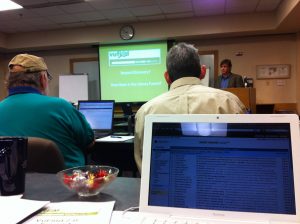This article is more than 5 years old.
The Vufind 2.0 conference day 1 started off with an opening chat by Joe Lucia about the relationship between open source software, open access policies and open data initiatives. He connected these rather current ideas to more traditional notions of libraries (resource stewardship and service for example) and touched on the idea that current trends including cloud-based systems and a trend towards network-based applications could prove to be challenging to our current model of open source software.
A discussion that focused on examples of systems and data that have been developed in either open or closed spaces showed the room tended to believe that that open source and library missions are close together. I thought that it was interesting to note that there was a view that the trend in implementing systems, data repositories and services in cloud environments was a step towards consolidation of vendors and a move away from the empowerment of smaller organizations. Interestingly there was a follow-up presentation by an ExLibris representative on a service that they are hosting on Amazon’s EC2 platform! For me the interesting idea that came out of the morning was that we are increasingly subscribing to data services rather than purchasing systems (SerialsSolutions for our openURL resolver, Syndetics content for our catalog) and that models for providing community driven, open data services (Hathi trust for example) are still evolving.
As JP’s post indicates there were many ‘good idea’ presentations and lively discussions on Wednesday. Demain Katz talked about the work he has been doing to turn Vufind into an OAI-PMH harvester and server (this would make it incredibly easy for us to harvest the items in Dspace and index them in Vufind), Greg Pendlebury talked about providing social software features at a network rather than individual library scale and there was an interesting discussion about using both Vufind and the XC metadata services toolkit to add authority data and authority management to Vufind (still pretty exploratory). JP and I also talked about the Voyager WebServices approach to providing book-based services in Vufind and brainstormed some options for indexing multiple databases in a single Vufind instance.
One of the overriding questions of the day was ‘where is vufind going and what role will it play in our organizations over the coming years?’ In afternoon breakout sessions there was a lively debate about indexing complex digital objects and metadata (EAD for example!) and what the best approaches were for handing non-marc data and services. Another group discussed linked data/authority records and a third group discussed network-scale issues in implementing Vufind.
Villanova has been a great host so far and both the facility we are at (The Villanova Conference Center) and the dinner last night were great. More to come after the Thursday session.

2 Comments on ‘Vufind, day 1’
Good stuff! Erik, I’m very interested in any info you can bring back on “XC metadata services toolkit to add authority data and authority management to Vufind (still pretty exploratory).” We’re exploring implementation of authority control in Voyager and will want to understand how that relates to VuFind and what is possible with VuFind that would impact what we choose to do about authority control in Voyager.
Will do – the authority integration stuff was pretty interesting. The ideas I heard indicated that harvesting and bib record updating for authority work was technically possible using these tools. Demian had done a proof-of-concept example of this